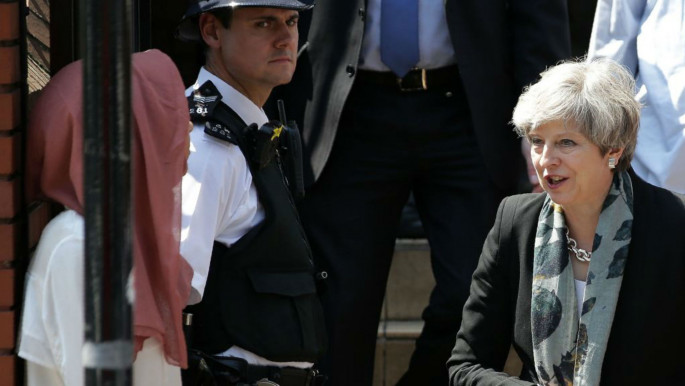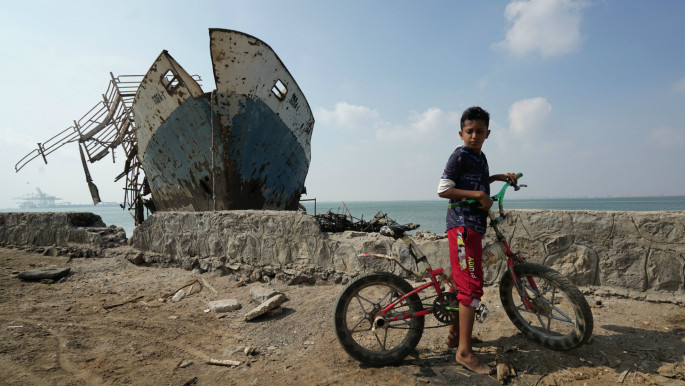Yemen 'welcomes' Ramadan amid war, blockade and fuel crisis
"Ramadan is a great time, it comes once a year and is a revered guest," Ahmed said.
A few minutes later, an aircraft was hovering in the sky of the capital Sanaa. Marwan and his family stopped talking about Ramadan.
"After the sound of the warplane, we expect a blast," he said. He was right, the explosion occurred minutes later.
A Saudi-led coalition warplane hit locations near the airport in the Houthi-controlled capital Sanaa, making millions of people in the city, including Ahmed, think that this Ramadan will not be free from bombings and the war will not spare civilians even in this holy month.
This is now the fifth time Yemenis have spent Ramadan while the country is plagued by a bloody war and relentless blockade plus multiple economic troubles.
This Ramadan, which began on May 6, appears to be more difficult as millions of people undergo severe humanitarian conditions while armed clashes keep intensifying in several battlegrounds.
"Every year, we say the coming Ramadan will be better. Sadly, the country has made no progress towards process and war continues to flourish," said Ahmed.
War alone is not the only thing wrecking the lives of civilians this Ramadan. Other issues, including price hikes, shortage of fuel and the outbreak of epidemics will also make this month miserable for multitudes of civilians particularly those who reside in conflict-stricken areas.
Civilians across Yemen are aware of the stark difference between Ramadan before and after the war.
 |
|
| Read also: I have a message for Theresa May this Ramadan |
"Prior to the war, we used to have a peace of mind during Ramadan. We used to focus on fasting and praying. Today, we have many more things to worry about. We are worried about the war. We struggle to make a living. We are concerned about contracting diseases such as cholera. Moreover, the prices of food commodities are making our lives tougher," said Ahmed.
A civil war engulfed Yemen in 2015 when the Houthi group ousted Saudi-backed President Abedrabbo Mansour Hadi. The conflict grew complex following the military intervention of the Saudi-led coalition, leading to a destructive war that has ruined the country with no peace prospects in sight.
Abandoning preparations for Ramadan
Being called as the most destructive conflict since Cold War, the conflict in Yemen has changed the way people live, and the way people receive Ramadan is an example of this.
Raof Mohsen, a taxi driver in Sanaa, still remembers when his family used to prepare for this month before the war. Today, the family no longer can afford to do the same.
"My father used to arrange everything at least one week before the beginning of Ramadan. We used to buy food commodities for the whole month. We used to paint the inside walls of the house and buy new mattresses. We used to have a special budget for Ramadan. Nowadays it is impossible to do that," Raof told The New Arab.
Since the war erupted, the economic situation has worsened while the number of food insecure people keeps rising. According to UN reports, the four-year war has set back human development in Yemen more than 20 years, while 80 percent of people now rely on humanitarian aid.
According to Yemen's Minister of Social Affairs and Labour Ebthaj Al-Kamal, over five million Yemeni workers have lost their jobs since the war breakout. Al-Kamal said the instability compelled many local and foreign companies to cease their operations and activities in the country.
Mohsen is an example of the many whose life has been disturbed by the war.
"For me and my family, this Ramadan is tougher than the previous one. The conflict has made our life worse as it continues every day, every week and every month," Mohsen said with a deep sigh.
Nasser Yahia, a vegetable seller, used to travel to the village before the start of Ramadan, as he preferred spending the fast with his family. But this year he is unable to travel.
"I cannot travel and spend my time in the village because I have to work. My family relies on me. Before the war, the expenses were cheap. YR100000, about $200, would be enough for the entire month. Now this amount of money will not suffice us to live comfortably throughout Ramadan," said Yahia.
War on people's livelihoods
Two weeks before Ramadan, the fuel crisis in Yemen began to rise. One reason is the blockade imposed by the Saudi-led Arab coalition. The second reason is the spread of rumours about the shortage of fuel and this leads some people to buy more to store it for Ramadan.
 |
|
| Read also: The dangers of war and climate change in Yemen |
In the midst of the fuel crisis, price hikes in Ramadan form a big headache for civilians. Basheer Ali, a resident in Sanaa, told The New Arab that the fuel crisis has hurt people as the war does.
"I am in Sanaa, feeling distant from the front lines yet I am not safe from the harsh consequences of fuel crisis. When I hear about the shortage of petrol or diesel, I know prices of commodities are to rise especially in Ramadan. The fuel crisis is a war on our livelihoods," said Ali.
"People in other countries receive Ramadan with a state of comfort and a peace of mind. Here, we receive it with price hikes and fuel shortage. If there is no solution for this issue in this month, Ramadan will be hard and people will keep queuing for petrol and diesel throughout the month," Ali added.
The Houthi-run Sanaa government have been accusing the Saudi-led coalition of intentionally blocking the arrival of basic commodities including petrol to the country while the Houthis are being accused of stealing the humanitarian aid intended to be given to the needy in Yemen.
"The warlords have mercilessly made us [civilians] suffer and they don't care if it is Ramadan or not," concluded Ali.
The writer is a Yemeni journalist, reporting from Yemen, whose identity we are protecting for their security.
Join the conversation: @The_NewArab





 Follow the Middle East's top stories in English at The New Arab on Google News
Follow the Middle East's top stories in English at The New Arab on Google News


